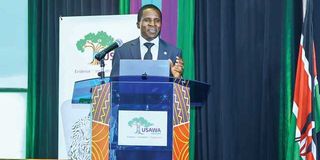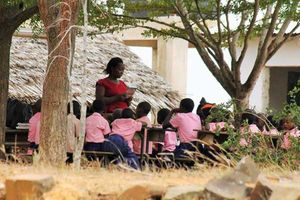
Usawa Agenda Executive Director Emmanuel Manyasa addresses participants during the launch of the Foundation Literacy and Numeracy Assessment 2023 report at the Kenya Institute of Curriculum Development in Nairobi on Thursday last week.
Just 60 per cent of teachers in public schools are employed by the Teachers Service Commission (TSC), with the rest hired by parents through school boards, a new study has revealed.
The study by Usawa Agenda, a non-profit organisation specialising in education issues, says nine per cent of teachers work as interns.
And shockingly, about six per cent of teachers in public primary schools have no formal training for the job.
The study also shows that rural public primary schools face persistent problems of under-staffing, reflected in a permanent and pensionable teacher-student ratio of 0.93, while urban schools have a higher ratio of 1.06.
Nationally, public schools face a general shortage of teachers, reflected in an average permanent and pensionable teacher-student ratio of 0.99.
The Foundation and Numeracy Assessment Report shows that 80 per cent of Board of Management (BOM) teachers earn less than Sh10,000.
About 20 per cent of BOM teachers fall in the Sh10,000 to Sh20,000 income bracket and only one per cent of them earn between Sh20,000 and Sh30,000.
Speaking at the launch of the report, Usawa Agenda Executive Director Emmanuel Manyasa said sources of funding for BOM teachers in public schools vary by location, with parents contributing Sh67 out of every Sh100 paid to them.
In rural areas, parental contribution increases to Sh70 out of Sh100, while in urban areas it decreases slightly to Sh60 out of Sh100.
"The government capitation grant is Sh6.7 out of Sh100 nationally, with a slightly higher contribution in rural areas at Sh7 out of Sh100. In contrast, urban areas receive Sh6.2 out of Sh100 government capitation,” said Mr Munyasa.
"A closer look at the data at the county level reveals distinct patterns: Kirinyaga County stands out with the highest percentage of teachers on permanent and pensionable terms, accounting for 93 out of 100 teachers. In contrast, Wajir County reports the lowest percentage, with only 63 out of 100 falling into this category,” Mr Munyasa said.
"The distribution of temporary teachers also varies significantly between counties. West Pokot County leads in this category, with 29 out of 100 teachers on temporary contracts. Conversely, Kirinyaga County has the lowest percentage of temporary teachers, with only 1 in 100 teachers falling under this classification. These county-specific findings shed light on the different employment dynamics within the teaching profession in different regions," he said.
At the same time, the Kenya National Union of Teachers (Knut) is rooting for a review of the terms and conditions of services for teachers serving under contract.
The union wants the two years renewable contract revised to one year after which teachers transition to permanent and pensionable terms.
Knut First National Vice-Chairman Malel Langat said the move would ensure that the widening teacher-student ratio is bridged and to boost morale of teachers in school.
“It is encouraging that the government has employed 56,000 teachers, with plans to employ another 20,000, but the terms of service for those engaged under contract should be revised,” Mr Langat said. He was speaking during Imarisha Sacco’s annual general meeting in Kericho at the weekend.
Mr Langat was accompanied by the union’s National Executive Council (NEC) member Mr Alfred Rop.
He said the huge discrepancies in payment for teachers who have the same training was a matter of concern and was affecting the quality of teaching.
“It is a matter of concern that graduate teachers are being paid Sh20,000 while P1 teachers earn Sh15,000 at a time when the country is faced with a high cost of living. This is a mockery to the noble teaching profession,” Mr Langat said.
He pointed out that the Employment Act 2007, part 5 (2) (3) (4) outlaws discrimination in the workplace.
“Teachers performing the same duties, carrying the same workload with the same expectations and results are unfortunately being paid differently by TSC. It is a matter that needs to be addressed by the government and all the stakeholders” Mr Langat stated.
The unionist said teachers who went to the same colleges and universities, are teaching in the same schools, but are paid differently because of their terms of service.








